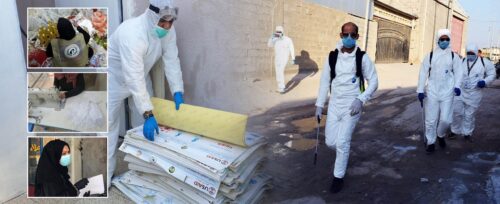From Community Influencers to Vanguards Against an Invisible Enemy, Keeping Citizens Safe from the Coronavirus in Iraq

As the coronavirus spread to all corners of the world, Iraq was one of the first countries that implemented stringent nationwide precautionary measures. The usual government and community activities were halted, and all efforts shifted to keeping citizens safe from the deadly virus. In cities and districts, local CSOs provide critical services to keep the situation from overwhelming Iraq’s fragile health facilities.
IGPA/Takamul placed civil society at the foundation of its efforts to build good governance across Iraq’s local government units. The Project trained CSOs to become effective partners and advocates in service delivery, integrating them into semi-formal public-private structures in provinces and districts that were created by IGPA/Takamul. When the coronavirus pandemic struck, the CSOs were already seasoned community workers and their army of volunteers was ready to spring into action.
Cognizant of their influence in the community, the Basrah Governor nominated local CSOs as members of the Joint Center for Monitoring and Coordination (JCMC) and local authorities invited them to be a part of the community crisis cells. “The district mayor asked us to be a part of the collective effort in the battle against the virus. In this important mission, IGPA/Takamul was with us in every step of the way, whether in coaching us in advocacy techniques for our campaigns, coordinating our movements or facilitating collaboration with concerned entities,” said Ruqaya Mahmood head of al-Soror Organization.
These volunteer groups went door to door, distributing informational materials, personal protective equipment, and sanitizers. They cleaned and fumigated public buildings and neighborhoods. They learned to make facemasks when commercial supplies ran out. They delivered food supplies with hope and cheer to vulnerable populations. For the most part, their activities were self-funded.
Durar al-Iraq, another IGPA/Takamul partner CSO, is a member of al-Zubair crisis cell. “At the request of the mayor, webegan producing facemasks for health workers, the police force, and the citizens. We mobilized other CSOs like Zubair Sports and Youth Forum and Zubair Women’s Workshop for Sewing and Needlework to help. We have produced more than we need and so we shared them with Basrah center district and al-Hartha,” said Hanadi, head of Durar.
“Via the communication platform that IGPA/Takamul created for us, we organized and distributed work to avoid overlapping or duplicating efforts with other CSOs. We consulted IGPA/Takamul team on our plans, and they guided us in every possible way,” Mohammed al-Asadi, founder of Hima Association, said. In Basrah, 16 CSO partners of IGPA/Takamul remain actively engaged in managing the health crisis.

